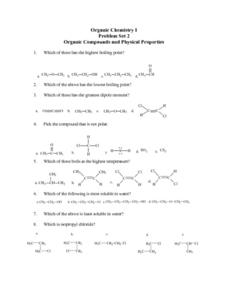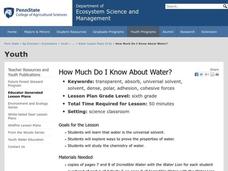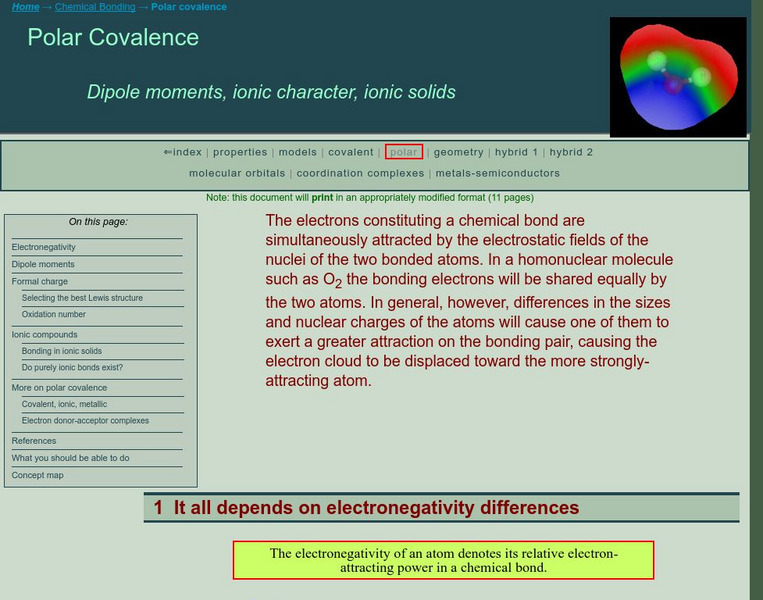Curated OER
Chapter 12 Review, Mixed Review: Solutions
Although there are only six questions on this chemistry handout, it makes a thorough review of solutions. Novices explain why a compound is not an electrolyte, identify types of compounds, and calculate moles, grams, and molalilties in...
Curated OER
Organic Compounds and Physical Properties
In this chemistry worksheet, young scholars identify which has the highest boiling point, as well as the lowest. Then they identify which compound is least soluble in water and why. Students also classify each of the compounds listed on...
Curated OER
Water the Universal Solvent
In this water and solvent instructional activity, high schoolers answer 20 questions about solutes, solvents, polarity in molecules, and the characteristics of water as a solvent. Students answer 3 questions about the lab they completed...
Curated OER
More Fun with Lewis Structures
In this compounds worksheet, high schoolers draw the Lewis structures for the given compounds, being sure to show the bond angles and molecular shapes. This worksheet has 6 problems to solve.
Curated OER
Water: The Neutral Substance
In this water worksheet, students read about hydrogen bonds in water and the differences in electronegativity between the oxygen atom and the two hydrogen atoms in water. Students answer four questions about the structure of water and...
Curated OER
Recognizing Polar Molecules
In this polar molecules worksheet, students complete a graphic organizer by writing in the bond type, electron dot diagram, and the type of compound for the chemical compounds given.
Curated OER
Review Questions-Molecular Geometry and VSEPR Theory
In this molecular geometry and VSEPR worksheet, students find bond angles, hybridization, determine polarity and draw orbital box diagrams of molecules. They determine molecular geometry and bond angles of given molecules and determine...
Curated OER
Dipole Moments
In this molecules learning exercise, students determine if the molecules given would have a dipole moment, either polar or nonpolar. This learning exercise has 27 fill in the blank questions.
Curated OER
What Are Nonliving Parts of Ecosystems?
In this ecosystem worksheet, students brainstorm the nonliving things found in a desert ecosystem and a polar ecosystem. This worksheet is a graphic organizer.
Curated OER
What is Climate?
In this climate worksheet, students will compare and contrast the characteristics of a polar climate with a temperate climate and write their answers in a graphic organizer.
Curated OER
Complex Analysis: Polar & Exponential Forms
In this polar and exponential form learning exercise, students use Euler's Formula to write complex numbers in exponential form. They write numbers in rectangular form. This two-page learning exercise contains seven multi-step problems.
Curated OER
Multivariable Calculus: Change of Variables Theorem
In this change of variables activity, students complete integral problems through the use of Jacobi's Theorem. They use various methods to convert from Cartesian coordinates to polar, spherical and cylindrical coordinates. This...
Curated OER
Earth And Beyond
In this earth and space worksheet, students identify and locate vocabulary terms and names related to earth and space sciences. There are 53 words located in the puzzle.
Curated OER
How Much Do I Know About Water?
Sixth graders explore ways to analyze the properties of water and examine the chemistry of water. In this water lesson students work in groups and complete several activities.
Curated OER
Polar Day: Living in the Canadian North
Students study the Canadian North. In this Canadian North instructional activity, students study the physical characteristics and the lifestyles of people in that region. Students complete map making and creative activities that help...
Curated OER
Habitats Pictures: Farm, Forest, Wetlands, Polar
In this science worksheet, students examine color pictures of 4 different habitats: farm, forest, wetlands and polar. There are no questions to answer.
Curated OER
Introduction To Polar Coordinates
Students investigate the polar coordinate system and practice plotting using Cartesian Coordinates. They find the angle and the radius and plot them while comprehending the ordered pairs using the x and y axis. The lesson includes...
Curated OER
Conversion Between Polar And Cartesian Coordinates
Students engage in a activity that is concerned with the conversiojn between Polar And Cartesian Coordinates. They convert betwen polar and cartesian equations. Students develop the conversion formula through review of previoius material.
Curated OER
Water and Land 207
Students examine maps of different projections, mathematically calculate distortions, and note the advantages and disadvantages of each map. They study the different maps and transfer the map to graph paper.
TED Talks
Ted: Ted Ed: How Polarity Makes Water Behave Strangely
Water is both essential and unique. Many of its particular qualities stem from the fact that it consists of two hydrogen atoms and one oxygen, therefore creating an unequal sharing of electrons. From fish in frozen lakes to ice floating...
University of Guelph
Canada's Polar Environments
This site is a set of images along with volumes of information make this site a treasure trove. The site has satellite images.
University of Colorado
University of Colorado: Ph Et Interactive Simulations: Molecule Polarity
When is a molecule polar? Change the electronegativity of atoms in a molecule to see how it affects polarity. See how the molecule behaves in an electric field. Change the bond angle to see how shape affects polarity. See how it works...
Simon Fraser University
Chem1 Virtual Textbook: Polar and Nonpolar Bonds
The General Chemistry Virtual Textbook, or Chem 1, is broken into several sections covering various aspects of topics related to chemistry. This section deals with chemical bonding and specifically the study of both polar and nonpolar...
Simon Fraser University
Chem1 Virtual Textbook: Chemical Bonds: Covalent or Ionic or What?
Use this resource to understand polar covalence in ion-derived solids.

























